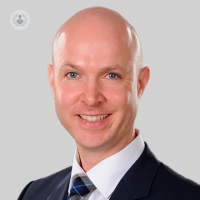Your treatment options for Ménière’s disease
Written in association with:Is there anything you can do yourself to treat Ménière’s disease? What are the options when it comes to medication? When is surgery necessary? We spoke with Professor Owen Judd, highly-trained consultant ENT surgeon with a special interest in neurotology.

Ménière’s disease is complex and there are many different types. However, over the years Meniere’s disease has been vastly over-diagnosed and so before offering any treatment at all it is imperative that we get the diagnosis right! It is actually a very rare condition and it is far more likely to have a much more common condition that can mimic Meniere’s such as vestibular migraine.
When we treat Ménière’s disease is those in which it is correctly diagnosed, you could say we are climbing a “treatment ladder”. We start by trying the first thing on the ladder, and if that does not work, we will try the next thing. Reassuringly, there are many rungs to this ladder. Here is an overview of your options if you have Ménière’s disease:
Lifestyle changes
For the vast majority of people, lifestyle changes can significantly reduce the frequency and severity of your symptoms. This is therefore the main treatment offered. This can include:
- avoiding caffeine and alcohol
- restricting salt intake to 1-2 grams per day
Medication
If lifestyle changes are not effective enough (which is rare), we can offer medication to treat the symptoms as well as medication which may help to prevent the onset of symptoms in the first place.
Symptompatic medication can include:
- Prochlorperazine, a phenothiazine dopamine antagonist, which acts as an antiemetic and relieves the symptoms of vertigo.
- antihistamines such as Cinnarizine
- newer drugs, such as Arlevert, which combines two antihistamines
Preventative medication can include:
- Betahistine, a histamine antagonist, although there is current evidence that shows that this drug may only work as a placebo. However as with any placebo treatment, if it works, it works!
- Bendroflumethazide, which may help prevent fluid build-up in the inner ear
Surgery
If neither lifestyle changes nor medication have been successful, we have a range of surgical options. These can broadly be classed into destructive and non-destructive procedures.
Non-destructive treatments would always be offered over destructive procedures.
Non-destructive procedures include:
- opening up the space in the ventilation tube using devices such as grommets
- employing a pressure pump (usually restricted to mild Ménière’s disease)
- steroids to reduce middle ear inflammation
- endolymphatic sac decompression
Finally, if you have severe and debilitating symptoms, more destructive procedures might be recommended. These can reduce the incidence of severe attacks of vertigo, but also run the risk of damaging hearing and balance.
Such procedures can include:
- Intratympanic Gentamicin injections – this is a targeted treatment aimed at ablating the vestibular structures while preserving hearing. It can reduce vertigo attacks in 90% of patients, but also causes 20% of patients to lose some hearing.
- Surgical labyrinthectomy – this cures vertigo but also destroys hearing. Luckily, it is almost never needed now that gentamicin injections are available.
- Nerve resection - this is a procedure aimed at selectively ablating the vestibular apparatus while preserving hearing. However, due to the extreme difficulty involved, it is also rarely performed.
As is hopefully clear, there are a wide range of options when it comes to treating Ménière’s disease. It’s important to note that the further down you look this list, the less likely you are to need the treatment. The other good news is that surgical techniques continue to improve, and we can look forward to an even greater variety of treatment options in the future.
Above all however, is to obtain an accurate diagnosis in the first place, as over the past few decades Ménière’s disease has been massively over-diagnosed, and most people do not actually have this condition. It is therefore very important that you see a specialist in balance or vestibular medicine to get the right diagnosis and treatment first time!


